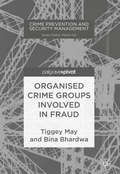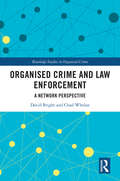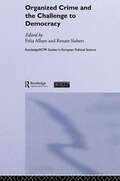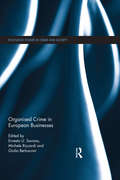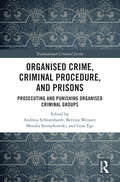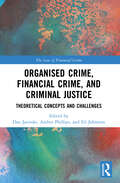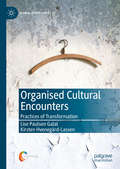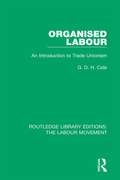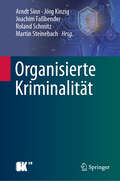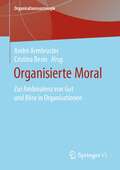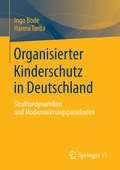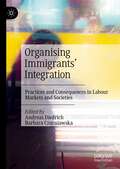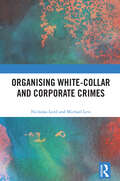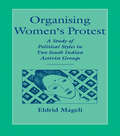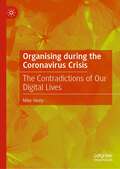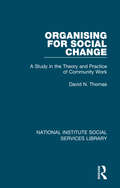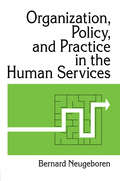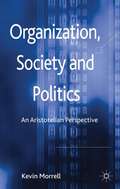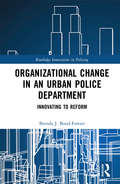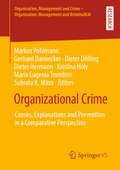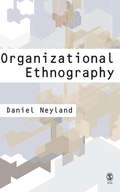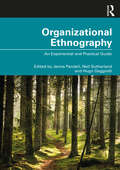- Table View
- List View
Organised Crime Groups involved in Fraud (Crime Prevention and Security Management)
by Tiggey May Bina BhardwaThrough analysis of data held by the National Crime Agency on organised crime groups, and in-depth analysis of qualitative interviews with convicted fraudsters and enforcement professionals, this detailed study fills a significant gap in the contemporary literature on organised crime groups involved in fraud.Throughout the chapters, the perspective of convicted offenders and those involved in its policing are juxtaposed to show the ease of committing fraud from the perspective of offenders on the one hand, and the investigative challenges experienced by law enforcement officers on the other. May and Bhardwa’s insights shed light on offender motivations, routes into fraud and organised crime, and the nature and shape of organised crime groups and their operations. Alongside the offender perspective the law enforcement interviews provide a unique interpretation of the procedural and legislative weaknesses that appear to allow this type of offender to make considerable financial gain. The key recommendations based on empirical findings will greatly benefit those interested in understanding the links between fraud and organised crime in the UK and those seeking to improve enforcement efforts.
Organised Crime and Law Enforcement: A Network Perspective (Routledge Studies in Organised Crime)
by David Bright Chad WhelanOrganised Crime and Law Enforcement: A Network Perspective examines organised crime and law enforcement through the conceptual lens of networks. The book takes stock of the many ways in which network theories and concepts, including social network analysis, can apply to studying both organised crime and law enforcement responses to organised crime. It is the first attempt to bring these diverse network perspectives and distinct fields of research together. The book is organised into two parts. The first part uses network perspectives to advance our understanding of the interconnected social structure of organised criminal groups, to expose their strengths and vulnerabilities, and to illuminate factors that enable such groups to undertake complex criminal activities. The second part uses a network lens to examine the challenges that organised criminal groups present for a wide range of law enforcement agencies, and the utility of network theories and concepts in understanding and informing their responses to organised crime. Written in a clear and direct style, the book will appeal to scholars and practitioners of criminology, sociology, law enforcement, and all those interested in learning more about theories of organised crime and its relationship with law enforcement.
Organised Crime and the Challenge to Democracy (Routledge/ECPR Studies in European Political Science)
by Felia Allum Renate SiebertThis innovative book investigates the paradoxical situation whereby organized crime groups, authoritarian in nature and anti-democratic in practice, perform at their best in democratic countries. It uses examples from the United States, Japan, Russia, South America, France, Italy and the European Union.
Organised Crime in European Businesses (Routledge Studies in Crime and Society)
by Ernesto U. Savona Michele Riccardi Giulia BerlusconiThe infiltration of organised crime in the legitimate economy has emerged as a transnational phenomenon. This book constitutes an unprecedented study of the involvement of criminal groups in the legitimate economy and their infiltration in legal businesses, and is the first to bridge the research gap between money laundering and organised crime. It analyses the main drivers of this process, explaining why, how and where infiltration happens. Building on empirical evidence from the Netherlands, Slovenia, Spain, Sweden, the UK, Ireland, Italy, France and Finland, Organised Crime in European Businesses is divided into four parts. Part I explores the infiltration of legitimate businesses to conceal and facilitate illicit trafficking. Part II examines the infiltration of legitimate businesses to develop fraud schemes. Part III focuses on the infiltration of legitimate businesses to control the territory and influence policy makers. Part IV concludes by considering the research and policy implications in light of these findings. Bringing together leading experts and detailed case studies, this book considers the infiltration of organised crime in legitimate business around Europe. It is an ideal resource for students and academics in the fields of criminology, economics and sociology, as well as private sector practitioners, public officials and policy makers.
Organised Crime, Criminal Procedure, and Prisons: Prosecuting and Punishing Organised Criminal Groups (Transnational Criminal Justice)
by Andreas Schloenhardt, Bettina Weisser, Monika Stempkowski, and Gian EgeThis book explores a range of topics relating to the prosecution and trial of organised crime and the punishment, especially imprisonment, of members of organised criminal groups. Organised crime poses particular challenges to the criminal justice system. While much of the attention of policy-makers, legislators, law enforcement, and the media is on criminalisation and investigation, much less attention, including academic analysis, has been devoted to the unique problems posed by organised crime to criminal procedure and to the prison system. This book gives particular attention to the role and powers of prosecutors and the judiciary, measures relating to criminal proceedings, international cooperation, sentencing, and the situations in prisons. The book is intended to be a valuable guide for academics, researchers and policy-makers working in the areas of organised crime, international criminal justice, criminal procedures, and prisons.
Organised Crime, Financial Crime, and Criminal Justice: Theoretical Concepts and Challenges (The Law of Financial Crime)
by Dan Jasinski, Amber Phillips, and Ed JohnstonOrganised crime and financial crime are pressing global problems, increasingly recognised as policy priorities both by national governments and international bodies and corporations. This proudly interdisciplinary collection is built on the premise that these topics are too often artificially separated, both in scholarship and the classroom. Bringing together scholars from law, the social sciences, and the humanities, this book showcases a diverse range of perspectives on these complex and compelling global issues, and the criminal justice challenges that they pose. The themes discussed include legal theory and procedure; regulation and enforcement; prevention and punishment; media representation and perception. Readers are encouraged to think outside traditional disciplinary bounds and form their own connections and conclusions inspired by the juxtaposition of perspectives rarely seen together in the same volume.
Organised Cultural Encounters: Practices of Transformation (Global Diversities)
by Lise Paulsen Galal Kirsten Hvenegård-LassenThis book explores a particular genre of intervention into cultural difference, used across the globe. Organised cultural encounters is an umbrella concept referring to face-to-face encounters that are organised across a wide variety of social arenas in order to manage and/or transform problems perceived to stem from cultural difference. The authors base their focus on empirical contexts either located in Denmark or related to a Danish organisation, investigating interfaith work, training sessions in diversity management, volunteer tourism, a youth diversity project called the Cultural Encounters Ambassadors, and a community dance project. Through different theoretical approaches, and careful analyses of the micro-level practices occurring within the time-space of specific encounters, Galal and Hvenegård-Lassen demonstrate how both the interactions and their outcomes are considerably more complex – and contradictory – than evaluative and instrumental accounts of success or failure may capture. This book will provide a valuable resource for practitioners and scholars of intercultural relations working in the fields of cultural geography, anthropology, cultural studies, and migration studies.
Organised Labour: An Introduction to Trade Unionism (Routledge Library Editions: The Labour Movement #10)
by G. D. ColeFirst published in 1924. This book provides a balanced picture of Trade Unionism as it was in the 1920s. The study opens with a brief outline of Trade Union history, before examining Trade Unions’ structure, its place in government, and the internal issues that Trade Unions faced. Organised Labour will be of great interest to students and scholars of labour and political history.
Organisierte Grenzrollen: Außendienst und Publikumskontakte in soziologischer Perspektive
by André Kieserling Martin WeißmannDie Beiträge dieses Bandes sind in der einen oder anderen Weise von zwei Begriffen aus dem Arsenal der soziologischen Systemtheorie Niklas Luhmanns und speziell seiner Organisationssoziologie inspiriert: dem Begriff der Grenzstelle und dem Begriff des Grenzsystems. Mit dem Begriff der Grenzstelle werden Abgesandte von Organisationen bezeichnet, die im Dienste von deren Zwecken und Bestandsinteressen auf eine relevante Gruppe von Nichtmitgliedern einwirken sollen, also etwa als Verkäufer auf Kunden oder als Pressesprecher auf Journalisten, und Grenzsysteme sind die aus diesem Anlass gebildeten Interaktionen, also etwa das Verkaufsgespräch oder die Pressekonferenz. Die Aufsätze behandeln unter anderem die Grenzstellen des Gesprächsleiters in der polizeilichen Vernehmung, des Diplomaten, des Verkäufers in seiner Nebenrolle als Aggressionsobjekt wütender Kunden, und zu den behandelten Grenzsystemen gehören Interaktionen wie Wohnungsbesichtigung und Vernehmung, Rettungseinsatz und Gerichtsverfahren.
Organisierte Interessen in der Kultur- und Medienarbeit: Eine Übersicht
by Aljoscha PaulusDie Studie untersucht, wie Kultur- und Medienarbeiter*innen in der Bundesrepublik Deutschland ihre arbeitsbezogenen Interessen organisieren und vertreten. Hierzu entwickelt der Autor einen theoretischen Bezugsrahmen, der ein politikwissenschaftliches Grundverständnis von "organisierten Interessen" mittels arbeits- und industriesoziologischen Perspektiven schärft und um Überlegungen aus jüngeren Forschungsprogrammen zu bewegungsorientierten Erneuerungsoptionen für arbeitsbezogene und speziell gewerkschaftliche Organisierung ergänzt. Auf dieser Basis erfolgt eine systematische und kritische Rekonstruktion und Diskussion von vorhandenen wissenschaftlichen Publikationen zu der Thematik. Das Ergebnis der Literaturstudie bilden einerseits theoretisch und empirisch fundierte Informationen zu zentralen Organisationsherausforderungen, zur historischen Genese sowie zum Status quo und zu jüngeren Entwicklungstrends der Interessenorganisierung und -vertretung im Feld kultureller-medialer Arbeit. Andererseits identifiziert die Studie im Forschungsstand zahlreiche offene Fragestellungen und Informationslücken, die abschließend als Forschungsdesiderat diskutiert und zur weiteren Exploration empfohlen werden.
Organisierte Kriminalität: Systematische Analyse der Phänomenbereiche und mögliche staatliche Reaktionen
by Arndt Sinn Roland Schmitz Martin Steinebach Jörg Kinzig Joachim FaßbenderDas Werk befasst sich mit dem Phänomen "Organisierte Kriminalität" (OK), das neben politisch motivierter Kriminalität und dem Terrorismus ein beherrschendes Thema in der deutschen und europäischen Kriminalpolitik und im öffentlichen Diskurs ist. Allerdings ist es der (Rechts-) Wissenschaft bislang nur unzureichend gelungen, das Phänomen der OK systematisch und umfassend zu analysieren, das Gefahrenpotenzial der organisierten Gruppierungen ganzheitlich darzustellen, die sich daraus ergebenden Herausforderungen für die Strafverfolgungsbehörden hinreichend zu beschreiben und nachhaltig wirksame Strafverfolgungsstrategien zur Bekämpfung der OK vorzuschlagen. Das Buch verfolgt das Ziel, eine Forschungslücke zur Organisierten Kriminalität zu schließen, indem eine ganzheitliche und systematische Analyse des Phänomenbereichs „OK“ unter Einbeziehung von Polizei- und Justizpraxis unternommen wird. Der Forschungsverbund hat in verschiedenen Modulen Strukturen, Entwicklungsdynamiken und Wirkungsmechanismen sowie die rechtliche und praktische Bewältigung von Organisierter Kriminalität, die Entwicklung von IT-Werkzeugen zur Erkennung von Organisierter Kriminalität im Internet und des aus Organisierter Kriminalität resultierende Bedrohungspotenzials untersucht. Die gewonnenen Erkenntnisse sind in konkrete Handlungsempfehlungen für den Gesetzgeber und Entscheidungsträger eingeflossen, die am Ende des Bandes vorgestellt werden.
Organisierte Moral: Zur Ambivalenz von Gut und Böse in Organisationen (Organisationssoziologie)
by Cristina Besio André ArmbrusterDer Band untersucht, inwieweit moralisch gutes oder schlechtes Handeln organisiert werden kann. Die Diskussion soziologischer Erklärungen des normativ Guten und Bösen in und von Organisationen beleuchtet den ambivalenten Zusammenhang von Moral und Organisation, da Organisationen sowohl für moralische Anliegen eintreten als auch moralisch-ethische Normen (teilweise sogar absichtlich) verletzen. Diese Ambivalenz adressiert der Band durch theoretisch-konzeptionelle Beiträge sowie durch empirische Studien. Der Band zeigt damit die große Varietät in der empirischen Beobachtbarkeit und der sozialwissenschaftlichen Analyse der Moralität von Organisationen – ohne selbst für oder gegen Moral zu argumentieren.
Organisierter Kinderschutz in Deutschland
by Ingo Bode Hannu TurbaKinderschutz ist seit Längerem ein ,,heißes" Thema in Politik und Gesellschaft. Die zahlreichen Medienberichte über kritische Ereignisse in Familien und das (angebliche) Versagen zuständiger Instanzen erregen regelmäßig die Gemüter derer, die sich urteilsfähig fühlen - und dies ist im Zweifel jeder Zeitbeobachter. Eine politische Initiative reiht sich an die andere, und auch in der Fachöffentlichkeit ist Kindeswohlgefährdung ein Dauerbrenner. Und doch besteht, ungeachtet zahlreicher Abhandlungen, einiges an Aufklärungsbedarf im Hinblick darauf, wie das Kinderschutzsystem funktioniert, welche Kräfte in ihm wirken, und wie seine jüngere Entwicklung zu deuten ist. Dieses Buch zeigt, was gewonnen werden kann, wenn man sich gleichsam aus der Vogelperspektive vergegenwärtigt, wie eine Gesellschaft unter Gegenwartsbedingungen Herausforderungen des Kinderschutzes zu bewältigen versucht und welche Einflüsse dabei eine Rolle spielen. Vorgelegt wird eine soziologische Analyse der Realität des organisierten Kinderschutzes, die dessen Systemzustände illustriert und die ,,hidden agenda" hinter ihrem Wandel beleuchtet.
Organisiertes Misstrauen und ausdifferenzierte Kontrolle: Zur Soziologie der Polizei (Organisationssoziologie)
by Martin WeißmannMartin Weißmann legt in diesem Open-Access-Buch theoretische Synthesen zu zentralen Themen der interdisziplinären Polizeiforschung vor und leistet damit einen Beitrag zur Integration dieser ansonsten oft empiristischen Forschung in die stärker theorieorientierte Soziologie. Er schlägt vor, (Kriminal-)Polizeien als Fall misstrauischer Sozialsysteme zu analysieren. Wie beispielsweise auch Geheimdienste oder der Investigativjournalismus sind sie auf die Gewinnung von Informationen über eine Umwelt spezialisiert, welche dies durch Prozesse des Verbergens und Täuschens erschwert.Empirisch behandelt das Buch zunächst die (Vor-)Geschichte polizeilicher Ermittlungsarbeit in Europa als Fall der Ausdifferenzierung, Professionalisierung und Organisationswerdung sozialer Kontrolle (untersucht an den Fällen Englands im 18. Jahrhundert sowie der Kriminalpolizeien in Paris um 1820 und Berlin um 1920). Die anschließenden Kapitel widmen sich der Arbeit von Polizisten mit Informanten und an Beschuldigten (in der Vernehmung) als Fall des Kontakts einer organisationalen Grenzrolle mit formal nicht zur Kooperation verpflichteten Nichtmitgliedern der Organisation. Und schließlich analysiert der Autor den polizeilichen Korpsgeist als Fall einer kollegialen Versicherungsgemeinschaft gegen die individuelle Verantwortlichkeit für Fehler bei der Arbeit.
Organising Immigrants' Integration: Practices and Consequences in Labour Markets and Societies
by Barbara Czarniawska Andreas DiedrichThis collection of field studies offers novel insights into the issues of migration and integration of immigrants. The focus of the chapters is on actions, processes, and complexity of organising practices, in contrast to more policy-oriented works. The contributors address vital questions: How is the labour market integration of refugees and other immigrants being organised in practice? What ideas of integration give rise to, and are promoted by contemporary integration initiatives? And what are the effects of these integration initiatives – on immigrants’ lives, and on their labour market integration in terms of diversity, gender, and power relations? With contributions highlighting the importance of coordination and collaboration for the successful organising of integration, this book should be of interest to researchers and advanced students from the fields of management and organisation studies, public administration and management, migration and integration studies, sociology, cultural studies and science and technology studies. It should also interest professionals and policymakers working with integration who face the challenges described here in their daily work.
Organising White-Collar and Corporate Crimes
by Nicholas Lord Michael LeviThis book explores how we can re-constitute our approach to analysing and empirically investigating the organisation of white-collar and corporate crimes, with a view to building fuller theoretical and empirical accounts. The work demonstrates how knowledge can be produced and systematised within a conceptual and analytical framework concerned with understanding how such crimes are organised, why they are organised as they are, who gets involved in them as primary offenders and as facilitators, and the ‘real’ factors that shape these organisational dynamics over time in particular contexts and under varying conditions. In doing so, the book examines the distal (far-off) and proximal (close) social arrangements and relations that create and shape emergent white-collar crime opportunities and their structures. It also investigates the mechanisms, relationships, processes, and conditions that are necessary for the commission, or the unfolding, of white-collar crimes, or for their non-commission. How these are contingently connected to particular contexts is explored. The work also considers the people who collaborate, connect, and otherwise associate, whether ephemerally or for longer periods, in the pursuit of criminal goals and the actual or potential skills, expertise, and abilities of these people to accomplish or resist particular behaviours that are required of them. Finally, the book assesses the human, social, cultural, and material antecedents that enable white-collar crimes to flourish or fade. The work will be of particular interest to scholars theorising about and empirically investigating white-collar and corporate crimes, or seeking to understand empirical approaches to analysing such behaviours and other types of crime. It is primarily aimed at critical social scientists, including criminologists and sociologists, as well as socio-legal, business, economics, and political studies scholars. The work will also be of interest to practitioners and policymakers keen to learn more about how and why these crimes are organised as they are.
Organising Women's Protest: A Study of Political Styles in Two South Indian Activist Groups (Nias Monographs In Asian Studies #No.72)
by Eldrid MageliThis study examines the nature of two women's activist groups in Madras and their activities since 1979, focusing on their work with the media, slum issues, registration of marriages and initiation of an apprenticeship scheme. But this volume is more than a study of women and their organisations. It is a study of political processes in which women are active, an attempt to discuss women's political behaviour in male-dominated society where official bodies, as well as the academic world, pay attention to 'women's issues' but where women as political actors continue to be invisible.
Organising during the Coronavirus Crisis: The Contradictions of Our Digital Lives
by Mike HealyThis book investigates the use of digital technologies for social organisation during the Covid-19 pandemic, interrogating the specific relationship between digital technologies and social movements. Drawing upon Marx’s theory of alienation and Antonio Gramsci’s concepts concerning common-sense, good sense, hegemony and praxis, the author examines the effectiveness of digital technologies in filling the social void created by the pandemic. A series of in-depth interviews across a spectrum of areas – from community activism, mental health, trade union organisation, the creative arts, and resistance movements – reveal how digital technologies flourished during the pandemic crisis, facilitating new ways to communicate. However, the interviews also throw into sharp relief the inadequacies of digital technologies. The book challenges conventional wisdom concerning the beneficial impact of digital machines on our lives. This book will have a broad appeal to anyone researching or teaching the societal, ethical and political implications of digital technologies, particularly from a qualitative perspective. It also has relevance for a wider readership concerned about the influence of social media.
Organising for Social Change: A Study in the Theory and Practice of Community Work (National Institute Social Services Library)
by David N. ThomasOriginally published in 1976, the aim of this book was to understand the contribution of community work to meeting some of the problems to be found in many of Britain’s inner city neighbourhoods. It describes the community work process and the tasks, roles and skills of the professional community worker as he interacts with neighbourhood groups and service agencies. The author also indicates some of the strengths of collective action and its likely benefits and costs to those who participate. The book includes an examination of how to effect changes in the delivery of services from statutory and voluntary agencies, as well as an assessment of the community project of which the author was a staff member. The book is a contribution to the theory of community work and practice, and it is based upon the experience of those who worked in, and used, the Southwark Community Project, established by the National Institute for Social Work. It was written for practitioners, teachers and students of community work, as well as for other closely involved in community affairs such as teachers, playground workers, planners and social workers.
Organization, Policy, and Practice in the Human Services
by Simon Slavin Bernard NeugeborenHere is a timely, insightful book that greatly increases the effectiveness of human service professionals and the organizations in which they function. Organization, Policy, and Practice in the Human Services is the first such text to bring together in a systematic fashion the concepts of organizational theory, policy, and practice in the human services. Offering a basic orientation to the structure and operations of social service organizations, Neugeboren addresses society’s need for the successful operation of these complex institutions in our highly organized society. He also calls for a re-examination of what is meant by “dependency” and postulates new methods of dealing with the social and personal problems confronting people in contemporary society. This book is indispensable for administrators, practitioners, and students. Practitioners gain instruction in “bureaucratic expertise,” enabling them to maximize opportunities, limit organizational constraints, reduce the likelihood of “burnout,’and otherwise become a “good bureaucrat” instead of an ineffective if well-intentioned one. Administrators will benefit from a model of organizational goals, practical guidelines for evaluating the effectiveness of an organizational structure, and methods for identifying and remedying the causes of organizational dysfunction. Neugeboren’s practical ideas make a significant contribution in preparing tomorrow’s social workers to deal more effectively with the world facing each of us. His theoretical insights are grounded in discussions of actual cases making them easy to apply to any human service organization.
Organization, Society and Politics
by Kevin MorrellThis thought-provoking book will appeal to both specialists and newcomers to Aristotle. Specialists will welcome the attention to original texts that underpin many of our ideas on politics, business studies, and other social sciences, whilst newcomers will appreciate the lucid summaries and applications that make Aristotle fascinatingly accessible.
Organizational Change in an Urban Police Department: Innovating to Reform (Innovations in Policing)
by Brenda J. Bond-FortierThis in-depth case study of a mid-sized police department captures the dynamics, struggles, and successes of police change, revealing the positive organizational and community outcomes that resulted from a persistent drive to reinvent public safety and community relationships. The police profession in the United States faces a legitimacy problem. It is critical that police are prepared to change constantly, be adaptive, and adopt openness to self-reflection and external comparison, moving beyond their comfort zone to overcome the inevitable cultural, structural, and political obstacles. Using previously unpublished longitudinal data examining a 25-year period, Bond-Fortier offers a rich account of the complexity of police management and change within one particular mid-sized city: Lowell, Massachusetts. The multidisciplinary lens applied provides crucial insights into how and why police organizations respond to a changing environment, set certain goals, and make decisions about how to achieve those goals. The book analyzes the community and organizational forces that stimulated change in the Lowell Police Department, describes the changes that enabled the department to achieve national model status, and builds a nexus between influencing forces, interdisciplinary theory, and the creation of an adaptive 21st-century police organization. Organizational Change in an Urban Police Department: Innovating to Reform is essential reading for academics and students in criminal justice, criminology, organizational studies, public administration, sociology, political science, and public policy programs, as well as government executives, crime policy analysts, and public- and private-sector managers and leaders engaged in professional development and leadership courses.
Organizational Crime: Causes, Explanations and Prevention in a Comparative Perspective (Organization, Management and Crime - Organisation, Management und Kriminalität)
by Dieter Hermann Markus Pohlmann Subrata K. Mitra Kristina Höly Gerhard Dannecker Dieter Dölling Maria Eugenia TrombiniThis book presents the results of an international comparative study on the causes of rule deviation in business and medical organizations. Based on document and interview analyses as well as experiments, the discrepancy between (state) regulations and organizational practice is elaborated and discussed in an interdisciplinary perspective. On the basis of the distinction between organizational and individual deviance, it could be shown across national boundaries that the unwritten rules of the organization make a decisive contribution in explaining organizational wrongdoing, as well as their containment. Implications for effective prevention derived from this are also pointed out.
Organizational Ethnography
by Dr Daniel Neyland'This is an excellent resource for those interested in studying organizations in both formal and informal contexts' - Choice Taking readers through the practical history of ethnography from its anthropological origins through to its use in a ever-widening variety of organizational, academic and business contexts, this book covers the whole research project process, starting with research design, and dealing with such practical issues as gaining access, note-taking, project management, analysing one's data and negotiating an exit strategy. It is highly practical and incorporates a range of case studies, illustrating organisational ethnography at work. This book is an invaluable resource for anyone wanting to plan and conduct their own ethnographic, observational or participant observational research in an organizational context, whatever their level of experience and regardless of whether they are studying a business organization or other types of organization such as schools and hospitals.
Organizational Ethnography: An Experiential and Practical Guide
by Jenna PandeliThis textbook explores practices, first-hand experiences and emerging ideas within organizational ethnography, providing a toolkit that prepares ethnographers for the uncertainties and realities of fieldworking. Students faced with the complexities of qualitative observational techniques and considerations, such as the scope of the research, the personal and professional intertwined life of the qualitative research or the decision of when to leave the field, will find the book an extremely useful, practical guide. A range of experiences from a variety of academics at different stages of their career, to highlight the differences in practices, approaches and encounters, are presented. The themes of the individual chapters cover three main areas: aspects to consider and reflect on before undertaking an ethnography, the process and experiences of conducting ethnographic work and considerations for after the fieldwork. Particular attention is given to appreciating the complexity and practicalities of ethnographic work, providing a more experience-driven text, and understanding perspectives from a range of different approaches to organizational ethnography. This book should be a recommended text for advanced undergraduate and postgraduate students studying research methods within Business and Management. It is particularly important for all students and academics undertaking qualitative research, especially ethnography.
